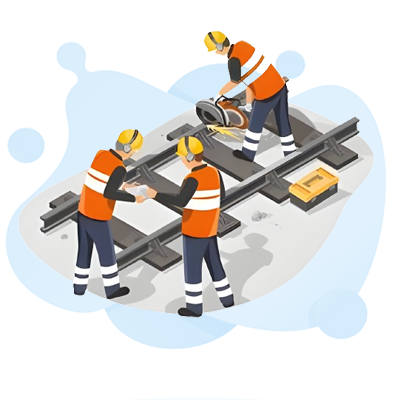GCOR (General Code of Operating Rules) Test

The GCOR (General Code of Operating Rules) test checks what you know about running trains and staying safe. It’s key if you want to be a conductor or an engineer. This test looks at lots of topics. You’ll learn about your role, how to talk on the railroad radio, the meaning of signals, and moving the trains. It also covers using switches and following the block system rules.
Free GCOR Practice Test Online
Key Takeaways
- The GCOR test is a critical assessment for railroad employees, particularly conductors and engineers.
- It evaluates knowledge of railroad operating rules, safety protocols, and transportation regulations.
- The test covers a wide range of topics, including communication, signaling, train movements, and operational procedures.
- Passing the GCOR test is a legal requirement for certification and employment in the railroad industry.
- Thorough preparation, including studying the GCOR handbook and practicing, is essential for success on the test.
Understanding the GCOR
The General Code of Operating Rules (GCOR) is like a handbook for railroad safety. It guides how trains, engines, and other parts of railroads should operate. All workers must follow these rules to keep everyone safe.
What is the GCOR?
The GCOR is the key to understanding how trains operate. It’s essential for safe and correct train handling. The GCOR details many areas, from engineer qualifications to rail safety checks.
Importance of the GCOR
The GCOR plays a huge role in railroad safety. Learning and following it shows a worker’s dedication to safety. It’s crucial for the job and a must for staying employed in the industry.

GCOR (General Code of Operating Rules) Test
Test Format and Content
The GCOR test checks your knowledge of the rules in the General Code of Operating Rules. It has both multiple-choice and true/false questions. You’ll need to know about responsibilities, communication, signals, and how trains move. This helps ensure those working on railroads know and follow the rules.
Preparation Strategies
Preparing for the GCOR test means studying the current GCOR handbook and other materials. Do practice tests and get extra training. It’s important to know key terms, what different workers do, and how to read signals. Reviewing communication and operational rules makes you better prepared. With these steps, you’ll be more likely to pass and be ready for your job in the railroad industry.
| Rule Updated Date | Speed Indicator Accuracy | Tunnel Procedure | Radio Communication for Pushing/Shoving | Headlight Dimming | Shoved Movement Speed Range |
|---|---|---|---|---|---|
| April 7, 2010 | 1.39 mph | Crew members must take prompt action | Radio communications must specify actions | When approaching or passing another train on an adjacent track | 6.5% |
| July 11, 2025 | 1.39 mph | Crew members must take prompt action | Radio communications must specify actions | When approaching or passing another train on an adjacent track | 6.5% |
| April 7, 2010 | 1.39 mph | Crew members must take prompt action | Radio communications must specify actions | When approaching or passing another train on an adjacent track | 6.5% |
| April 7, 2010 | 1.39 mph | Crew members must take prompt action | Radio communications must specify actions | When approaching or passing another train on an adjacent track | 6.5% |
| April 7, 2010 | 1.39 mph | Crew members must take prompt action | Radio communications must specify actions | When approaching or passing another train on an adjacent track | 6.5% |

Conclusion
The GCOR (General Code of Operating Rules) test is very important for the safety of railroad activities. It makes sure that those working on the railroads know the rules well. This includes conductors and engineers. By passing the GCOR, they show they are focused on safety and understand key rules for moving trains and using signals.
To succeed in the GCOR test, preparation is key. This involves reading the GCOR handbook, taking practice tests, and training. Passing the GCOR is a must and proves how dedicated someone is to running trains safely and correctly. It’s a big part of keeping the railroad industry safe and following the rules.
Recently, the GCOR rules were updated to include new safety steps. For example, a newer form must be filled out in front of a Union Pacific Manager. Also, it’s now a must to report personal injuries or illnesses right away. These changes show the industry’s strong focus on worker safety and health. By following these updates, railroad workers show they are professional and help keep the transportation network safe.
FAQ
What is the GCOR (General Code of Operating Rules)?
The GCOR (General Code of Operating Rules) sets safety and efficiency standards for trains and railway equipment. It tells railway workers their duties and how to keep things safe. This ensures train operations are safe.
Why is the GCOR important in the railroad industry?
It’s key for safe railway operations. Knowing the GCOR well is vital for doing your job right and remaining in the field legally.
What does the GCOR test cover?
The test checks on the person’s knowledge of GCOR rules. It looks at things like duties, communication, signs, moving trains, switches, and specific rules for different railway areas.
How can individuals prepare for the GCOR test?
Preparing involves studying the GCOR handbook and any updates. Also, doing practice tests and getting some training helps.